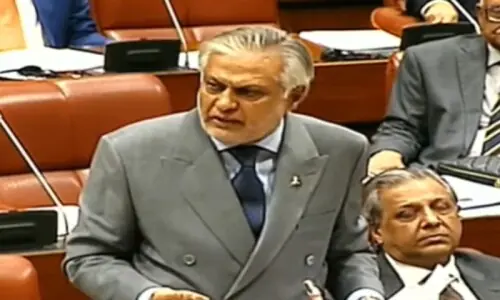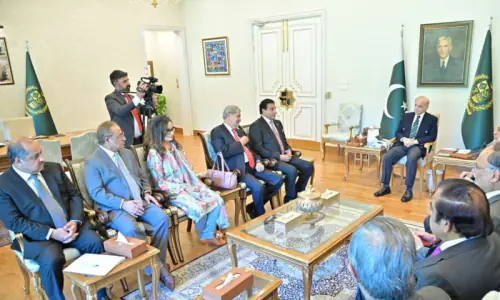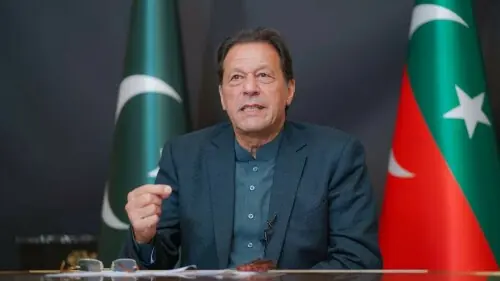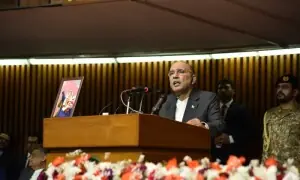Da Sanga Azadi Da — "What freedom is this?" — is the Pashtun Tahaffuz Movement (PTM) anthem heard at their gatherings and jalsas.
PTM’s figurehead, Manzoor Pashteen, asked that question in Karachi — the world's largest Pashtun city by population — on Sunday, May 13, as the PTM headed over to Pakistan’s main metropolis.
Karachi, after all, is where a young Pashtun from Waziristan, Naqeebullah Masood, was killed in an extrajudicial encounter by the police on suspicion of terrorism on January 13, which provided impetus for PTM’s rallies and demands for fair treatment from the state.
But if we are to trace the origins of some of the grievances of the Pashtuns of Pakistan's tribal areas, we will have to go all the way back to 1893 — to the year when the Durand Line was set in stone as a border separating British India from Afghanistan.
The creation of this border-province begins the story of the continued maltreatment of the Pashtuns inhabiting these areas.
Characterised by the Raj as ill-defined and turbulent, these regions compromised the defence of the borders of British India. They did not border a recognised foreign power; rather, they separated the Raj’s dominion from the 'wild', 'lawless, 'unsettled' and 'warlike' tribes living in the hills that stretched into Afghan lands.

Eventually, these borderlands were assimilated into the Pakistani state post-1947 and incorporated into what we now know as the Federally Administered Tribal Areas (Fata). For the residents of this region, however, not much has changed in over a century in terms of infrastructure and development.
The curfews, coercion and oppression that the PTM protests against today trace their roots to laws created by the Raj.
The basic aim of the Raj was to ensure that order prevailed along British India’s periphery and that a 'safe and permanent frontier' was established along its borders.
In 1898, the London Times ran a report on these policies of the Raj:
"Now that we had established our authority and supremacy over the district in which warlike operations [the Afridis revolted after the Durand line was proclaimed — a revolt which the British successfully quashed] had been taking place, it seemed an opportune moment to define what were the objects which we should wish to promote, what should be our frontier policy in India.
"[Lord George Hamilton] had always held that the presence and the advance of Russia in Central Asia was a factor connected with our frontier policy which we could not ignore.
"We must protect our subjects [referring to subjects in Punjab and Sindh] and must ensure that the tribes under our influence [are] not interfered with."
And while the rest of British India was a crude reproduction of the metropole — introducing a centralised state that had ostensibly modern forms of governance, a bureaucracy, defined territory and a monopoly over violence — colonial rule in borderlands was markedly different.
As opposed to pursuing a project of modernisation, the goal was to ensure that the frontier’s ‘unruly’ tribesmen did not integrate with the rest of the territories of the Raj.
Galvanising the Raj’s impulse towards the institutionalisation of difference and excluding the frontier and its inhabitants from the colonial state were the Frontier Crimes Regulations (FCR), established as law over Bajaur, Mohmand, Khyber, Orakzai, Kurram, Waziristan — the borders of NWFP — in 1901.
These regulations transformed tribesmen into imperial vassals, denied them access to colonial courts and Raj governance and yet, expected them to act in accordance with the interests and concerns of the overarching imperial state.
Subsequently, under the guise of respecting the independence of the tribes, the Raj’s road and railway construction was limited to the areas of British Baluchistan — and not the border region — and irrigation projects were limited to the provinces of Sindh and Punjab.
At the same time, service in tribal militias — which served on colonial outposts and checkpoints along the frontier region’s border with Afghanistan — transformed Pashtuns into wage labourers, tying them further into the colonial economic system at minimal cost, and consequently, to the colonial state.
Colin Metcalfe Enriquez’s The Pathan Borderland — published in 1921 — describes this as a "marvelous method":
"Not the least wonderful of the many marvelous methods employed in keeping our fickle and excitable neighbours [North of the Durand Line] in order is the use made of the Pathans themselves to protect our marches."
According to Enriquez’s chronicle, the number of troops — militias, border military police and levies — along the border numbered 10,440 in July, and all but 1,150 were Pashtun.
The FCR recognised and codified the existence of the jirga, or Council of Elders. But while the jirga's punishments and decisions were based on tribal customs, the FCR allowed and empowered the British Deputy-Commissioner to make both civil, and criminal, references to Councils of Elders.
In addition, where the Deputy-Commissioner believed that a civil dispute was likely to lead to a blood-feud or a breach of peace — especially in cases where a frontier tribesman was party to the dispute — he was at the liberty to refer the case to a jirga of his own nomination.
In other words, supreme power lay in the hands of the Deputy-Commissioner: he could question the jirga's decisions, veto or pass criminal sentences and bar hostile tribes from entering British India.
And because of the Raj’s stifling military presence in the tribal borderlands — with four 'movable columns' in Peshawar, Kohat, Bannu and Dera Ismail Khan, along with multiple corps of military police, levies and militia across the region, from Waziristan right up to Chitral — these tribes, more often than not, had no option but to accept the terms laid upon them.
For example, a 1919 Nottingham Evening Post report states that the "Mahsuds accepted all our [referring to the Raj] terms, which include an unopposed march through their territory and the continuance there of our troops until all fines have been paid."
In addition, Article 11, Section (1) of the FCR stated, "The Deputy Commissioner may or if the Commissioner so directs, shall, by order in writing, refer the question to the decision of a Council of Elders (jirga), and require the Council to come a finding on the question after such inquiry as may be necessary and after hearing the accused person. The members of the Council of Elders (jirga) shall, in each case, be nominated and appointed by the Deputy Commissioner. [emphasis added]"
More importantly, with Article 36, the FCR granted the British government the authority to "remove persons" — with "remove" ostensibly referring to a colonial form of deportation: one that forced inhabitants of the frontier region to "reside beyond the limits to which this regulation [the FCR] extends."
In 1937, the Evening Telegraph and Post in Dundee, Scotland reported about "Tribal Hostages Handed Over". It detailed that over a hundred men were "handed over as hostages" to the Government of India by the jirga of the Tori Khel tribe in Mirali, Khaisora Valley, Waziristan.
This "handing over" of men was part of the conditions laid down upon the Tori Khel tribesmen by Major-General D. E. Robertson, Commander of the Waziristan district, "to ensure peace."
In addition, the FCR lacked basic civil protections, allowed collective punishment of individual crimes and placed extraordinary discretionary powers in the hands of the officers of the Raj.
A 1914 report in London’s The Times titled "Indian Frontier Tribe Chastised" described the "punishment" of the entire Bunerwal tribe as a consequence of a raid carried out by a few tribesmen:
"The column set out to execute reprisals on the Bunerwal tribesmen who recently raided British territory has, after a tiring night march, taken the villages and captured a number of prisoners."
When Pakistan gained independence in 1947, the new state kept the architecture of tribal governance in place, thus keeping tribesmen of the frontier outside the realm of citizenship and leaving them in a state of perpetual dislocation.
It wasn’t until 1997 that regions governed by the FCR were granted representation in the national legislature. Party-based elections – after much debate and deliberation – were introduced to the region in 2013.
The recently passed Fata reforms bill proposes abolishing the FCR altogether (there were substantial amendments to the FCR in 2011), bringing the region into the fold of the province of Khyber Pakhtunkhwa, as well as expanding the jurisdiction of the Supreme Court and the Peshawar High Court to the region.
While the bill has been approved and signed by the President, its terms haven’t been made law as yet due to political reasons.
There has also been talk of granting Fata a share in the NFC award — this proposition has allegedly been opposed by other provinces.
But the military checkposts across Fata remain standing. They are physical reminders of over a century of high handedness.
And the people of Fata remain confined to the margins of the state, excluded from the national body politic and defined by an era of colonial governance with limited rights and restricted access to judicial systems.































